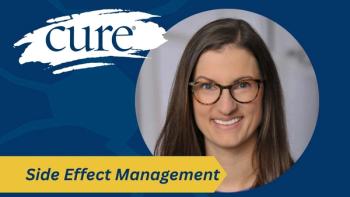
- Spring 2011
- Volume 10
- Issue 1
Lifting the Fog on Chemobrain
New research helps clarify what chemobrain is and why it happens.Â
Ever since he was a child, Adam Holloway wanted to be a pilot. He was well on his way in spring 2010. Holloway received his private pilot’s license the previous July and was only a semester away from earning a degree in aeronautical technology at Kansas State University Salina—the final step before earning a commercial pilot’s license.
Then in March 2010, while on spring break at his family’s home in McAllen, Texas, he received a diagnosis of stage 4 Hodgkin lymphoma, a cancer of the lymphatic system. He was treated with surgery at M.D. Anderson Cancer Center in Houston. Then he received chemotherapy, supplemented with an experimental treatment, SGN-35, on a clinical trial.
The chemotherapy worked, and Holloway’s cancer went into remission. But sometime in the midst of his 12 treatment cycles of chemotherapy, Holloway lost his mental focus and began having trouble with short-term memory.
"I seemed to forget stuff that had happened," Holloway says. "Usually I'm pretty good at remembering names of people. I found myself saying, 'Sorry, I forgot your name.'"
Holloway’s mother, a nurse who has worked with oncology patients, was the first person to suggest that he might have chemobrain, an ill-defined disorder experienced by some cancer patients who have struggled with cognitive function. “I was having trouble thinking of something, and my mom was joking with me that it’s chemobrain,” he recalls. “That’s how I learned about it.”
No Joking Matter
While patients have been telling their oncologists about unexpected difficulties with word recall, memory and concentration for years, most doctors were hesitant to acknowledge the condition. It took decades for research on chemobrain to gain traction, says Tim Ahles, PhD, a behavioral psychologist who leads the neurocognitive research lab at Memorial Sloan-Kettering Cancer Center. Ahles says investigators have had a tough time applying science to cancer patients with such a range of cognitive complaints and diverse diagnoses. In addition, patients often suffer from accompanying problems, such as anemia, pain, depression and other illnesses that can affect brain function.
Christina Meyers, MD, PhD, director of the neuropsychology section at M.D. Anderson, says cognitive dysfunction related to cancer treatment has become a burgeoning area of investigation, one where patient advocacy has helped move the research forward. “When I started at M.D. Anderson, I was just a lone person giving memory tests to people who had cancer,” she reflects. That was 26 years ago.
Meyers says that cognitive function issues are seen in survivors “across the board.” She has seen it in patients with leukemia, lung and testicular cancers. She estimates about 60 percent of patients she has assessed show a cognitive decline. “Often the patients look really good, but it’s a huge effort. The mental cost to function at that level is very taxing,” she adds.
Meyers says the most common problems she encounters are lapses in short-term memory, difficulty finding intended words and impaired executive function—the brain function that is necessary for multitasking and focusing. Other frequent complaints include difficulty reading and trouble with math. Some patients experience a more global sense of mental fatigue. Meyers says research has also shown that chemobrain can include impaired balance and motor skills in some patients where fine motor dexterity and speed of accomplishing manual tasks are affected. “This kind of impairment can be a stumbling block for someone who wants to go back to college or work,” she says.
Not a New Phenomenon
Ahles says he isn’t surprised that physicians don’t recognize the disorder because they are not trained in cognitive dysfunction. Among patients with just one cancer type, treatments range in forms, doses and regimens. “It’s hard to know which agents are the bad actors because everything’s given in combination,” Ahles points out.
Add to that the fact that the condition lacks a precise definition and has a variety of symptoms that are subjective and vague. There isn’t a formal medical term for the syndrome, nor is there a listing in the current Diagnostic and Statistical Manual of Mental Disorders. Results of studies are often subtle, as well, Ahles says. “Cancer patients who come to academic medical centers for cognitive testing appear to have normal capabilities. Yet they often score a lot worse than you’d expect based on their age and occupation.”
Yet the concept has been around since the 1970s, Ahles says. In 1980, Thomas Oxman, MD, and Peter Silberfarb, MD, published a
Most early clinical studies on the issue focused on cognitive changes in breast cancer and lymphoma patients because they are the largest groups of relatively young, surviving patients who’ve received chemotherapy. In patients who are elderly, there’s more of a risk of mental decline due to vascular changes, dementia and other illnesses, Ahles says.
A current focus is to understand who is at risk for chemobrain so that patients can better gauge their risk for cognitive impairment. Ahles says age is an obvious factor, but genetics might also play a role. Ahles and other scientists are examining specific genes that may contain inherited variants associated with more susceptibility to cognitive deterioration as a result of cancer treatment. These include a variant of apolipoprotein E (APOE), which is implicated in Alzheimer’s disease, and the gene for catechol-O-methyltransferase (COMT), an enzyme that may alter brain activity and signaling.
Other potential culprits include faulty DNA repair mechanisms and factors already associated with elevated risk for neurological diseases, such as Alzheimer’s and Parkinson’s, but none of these have been proven, Ahles emphasizes. He anticipates that emerging data from animal research studies will help elucidate the effects of specific chemotherapy agents, but making decisions about trading off the benefits of chemotherapy against the cognitive side effects is difficult because of the lack of quantitative information about who is at risk, how likely one is to have side effects and how severe or prolonged they might be.
Since the large randomized trials that compare treatment regimens to gather and analyze cognitive data are still in the future, Ahles says patients should address this aspect of chemotherapy side effects as part of the informed decision-making process.
“It’s kind of like when a fluorescent bulb goes on and off, and sometimes flickers in between,” says 59-year-old Mary Kemp, who has metastatic breast cancer and has experienced two versions of chemobrain.
Living in a Haze
At the time of her original diagnosis in 1993, Kemp received adjuvant chemotherapy for a stage 2 tumor. She was working in the library at University of Wisconsin River Falls. At that time, her chemobrain was limited to word-finding difficulty. “There was a disconnect between my mind and my tongue,” she recalls. “I’d want to say the word ‘tree,’ and my mind would picture a tree, but I couldn’t say it.”
The symptoms reversed entirely once chemotherapy ended. “I was only 42 then. It got better.” Her oncologist didn’t believe that chemotherapy affected the brain, she says. “But they didn’t believe in chemo-caused fatigue then, either.”
Kemp resumed her full-time work at the library while taking tamoxifen for seven years. She divorced and remarried, and her life seemed back on course. In 2008, the cancer came back in her bones. Now, at 59 and a grandmother of three, she’s been on various hormonal treatments and chemotherapy. She complains of mental cloudiness that affects her activities most days.
Kemp, who was an avid reader, says her attention span is now limited when enjoying books. “I can’t remember who the characters are,” she explains. “I go back to reread the first pages.” She says she still “power knits,” but her typing skills have been affected.
Kemp says she realizes that her chemobrain symptoms might come from other causes besides her cancer treatment. “It could be emotional changes or other medications or the cancer itself,” she says. Still, she’s convinced that chemobrain is very real and disabling. “It irritates me when the people without cancer minimize it and say, ‘Yeah, I have chemobrain,’ if they forget something. Those remarks downplay the syndrome’s reality.”
Recent studies also call into question whether hormonal therapy can affect cognitive function, says Steven Castellon, PhD, a neuropsychology specialist at UCLA Medical Center’s Stewart and Lynd Resnick Neuropsychology Hospital in Los Angeles. His group has reported that long-term breast cancer survivors who received tamoxifen, an anti-estrogen, in addition to adjuvant chemotherapy tend to experience cognitive decline several years after treatment, as compared with breast cancer survivors who received chemotherapy alone or who took no adjuvant treatment. He says the condition affects men too, including patients with prostate cancer who undergo hormonal therapies. “Chemobrain does not discriminate by gender,” he says. “Fewer men are out there who are willing to admit it.”
Castellon wants to be sure patients understand that these changes are not like those seen in Alzheimer’s. “Still, most researchers agree there’s a subset of patients who suffer a variety of cognitive problems during and shortly after chemotherapy. A smaller group will have lingering complaints after completing treatment,” he says. “It’s possible there’s a vascular insult that happens with certain chemotherapies,” he added. “Taken together, there’s a definite risk for cognitive defects.
“If we can develop a strong science around it, we can get to the point where people can make more informed treatment decisions,” he says, adding that there is enough information now for oncologists to bring it up with their patients as a possible long-term effect.
Fighting the Fog
Holloway finished physical and occupational therapy in McAllen, where he worked on balance, hand manipulation and mental exercises. He is now back at KSU Salina finishing his class work and considering his future as he moves beyond treatment for Hodgkin lymphoma.
“I would love to get back and fly,” he says. Still, he doesn’t regret his decision to receive needed cancer treatment.
Articles in this issue
almost 15 years ago
Blog: A do-it-yourself treatment program for cancer survivorsalmost 15 years ago
Blog: Hair, Glorious Hairalmost 15 years ago
Words of Wisdomalmost 15 years ago
Videos from Yoga Bearalmost 15 years ago
Chilling Hair Newsalmost 15 years ago
Herb Could Work Against Advanced Breast Canceralmost 15 years ago
JourneyForward.orgalmost 15 years ago
Predicting Colorectal Cancer Recurrencealmost 15 years ago
Transplants More Effective for Young Adults with AMLalmost 15 years ago
Letters From Our Readers


